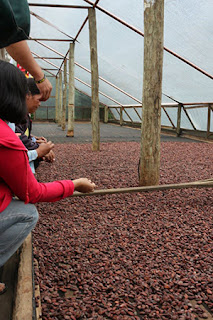From this article, I learned that cacao has been cultivated in the Philippines since the 17th century and that there has been a major decline in cocoa production there since 1988. It would appear that by 2006, cacao was planted on less than 10,000 hectares across the country with the majority of it coming from the Davao region.
According to the article, the estimated volume of cocoa production in 2008 was only 6,000 to 7,000 tons with more than 95% of it used locally.
But it seems there is growing local interest in cacao farming credited mostly to the SUCCESS Alliance Philippines Phase II program funded by the U.S. Department of Agriculture and implemented by U.S. non-profit ACDI/VOCA (Agricultural Cooperative Development International and Volunteers in Overseas Cooperative Assistance) and its local partner The Cocoa Foundation of the Philippines (also called CocoaPhil). According to the project profile page on the ACDI/VOCA's web site, "SUCCESS" stands for Sustainable Cocoa Enterprise Solutions for Smallholders. Starting in 2006, it was a $2.6 million program over 3 years to help improve cocoa production and marketing linkages.
The demand is there. Locally, the Philippines needs about 32,000 tons of cocoa production to meet local demand which means the majority is imported from elsewhere. There is also a shortage of high-quality cocoa.
There is currently more than 2,000,000 hectares of coconut lands where cacao can be inter-planted. The coconut trees provide the necessary shade coverage for ideal cacao planting conditions. The profit potential is huge. More than $1,500 per hectare of net income can be generated from 500 mature trees each year. The international demand for cocoa beans is growing at about 90,000 tons annually. Regional demand from Southeast Asian grinders is at 220,000 tons that is imported from Africa and other distance countries. According to their web site,
"ACDI/VOCA achieves this through activities that deliver farmer training and extension, establish post-harvest processing sites, build capacity in nursery plant production, rehabilitate old cocoa trees and establish internationally acceptable cocoa bean quality standards. A major focus is promoting the opportunities and participation of smallholder farmers in the cocoa value chain as a means of poverty reduction and economic growth."They have trained more than 150,000 local farmers. They have helped approximately 800 farmers improve productivity and quality of 400,000 cacao trees. They have distributed over 1.12 million plants to farmers.
It's clear that ACDI/VOCA has made tremendous strides towards improving cocoa production. I'll reach out to them to explore the possibility of doing my global internship with them. It would be really interesting to see how they would measure their own success now that the program has concluded in 2009.
Note: Photos here taken from ACDI/VOCA's Facebook page.



No comments:
Post a Comment